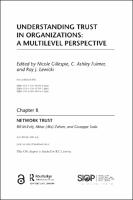Chapter 8 Network Trust
Proposal review
Author(s)
McEvily, Bill
Zaheer, Akbar
SODA, Giuseppe
Language
EnglishAbstract
In this chapter we aim to move beyond the extensive focus on relational trust in the organizational literature by broadening the conceptualization of trust to include its inherent generalizability across a network. Specifically, we introduce the concept of network trust. Central to our conceptualization is the idea that apart from forming as a result of direct interaction, trust also flows through the indirect connections linking individuals to one another and emerges from the inherent design features of the network itself. We further conceptualize network trust as comprised of two forms: second-hand trust and prototrust. Secondhand trust refers to the partial spillover of relational trust to socially proximate, indirectly connected actors. Prototrust refers to the latent potential for confident positive expectations to emerge between two actors who are neither directly nor indirectly connected. Drawing on network theory, we articulate the logics (in terms of mechanisms, indicators, and contingencies) by which secondhand trust and prototrust operate. We conclude with a call to treat network trust as a novel form and with an agenda for considering the unique understandings that network trust permits.
Keywords
network trust, trust, second-hand trust, prototrust, relational trust, network theory, mechanism, indicators, contingencies, tie strength, social distance, network closure, vertical network differentiation, governance veracity, identity authenticity, swift trustDOI
10.4324/9780429449185-8ISBN
9781138327580, 9781138327597, 9780429449185Publisher
Taylor & FrancisPublisher website
https://taylorandfrancis.com/Publication date and place
2021Grantor
Imprint
RoutledgeClassification
Personnel & human resources management
Organizational theory & behaviour
Psychology
Occupational & industrial psychology
Personnel and human resources management
Organizational theory and behaviour
Psychology
Occupational and industrial psychology


 Download
Download Web Shop
Web Shop